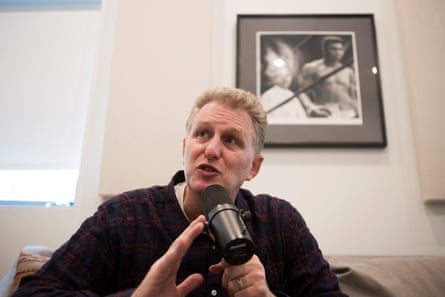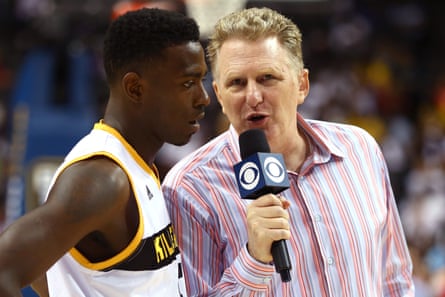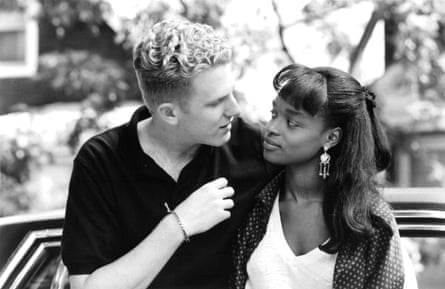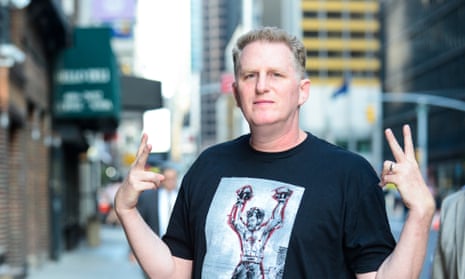Michael Rapaport does not want to lose his cool. And for most of our otherwise pleasant and meandering visit over Zoom in June, he doesn’t. Until Kevin Durant’s name comes up.
Back in April, Rapaport tweeted screenshots of a private Instagram exchange with the Brooklyn Nets swingman that came after Rapaport criticised one of Durant’s post-game interviews. In it, the 11-time NBA All-Star unleashes a fusillade of profane insults – leaning on homophobic and misogynistic language as hard as he does undersized defenders on the low block – before invoking Rapaport’s wife and challenging him to a fight.
“Me and mike talk CRAZIER than this on the regular and today he’s pissed,” explained Durant. “My bad mike, damn!!” Rapaport then replied with misogynistic language of his own.
The entire back-and-forth had NBA Twitter in a froth, and before long their fiery feud was singeing the eyebrows of the league itself. After, the NBA condemned the remarks as “offensive and derogatory”, Durant was forced to accept a $50,000 fine and issue a public apology.
When I speak to Rapaport he’s beaming in from his Brooklyn home on a bright late morning, and is every bit as irascible as this Twitter exchange suggests. I ask if he’s cut Durant a refund check yet, and holy hell does he hit the ceiling. “Fuck him and his disrespect and thinking he can tweet people and shit on them,” Rapaport snarls. “The 50 grand, that’s part of [his] deal, you know? And anyway, it’s like a normal person buying a 50-cent candy bar. Stop DMing people. This is not banter.”
Damn, Mike. I thought y’all were friends?
“He misreported it!” Rapaport says. “We’re not fucking friends. That’s not the way I talk to friends.”
Rapaport made his name as a character actor playing the classic, fast-talking New York noodge. In fact, you’d be hard-pressed to name another career scene-chewer that’s matched Rapaport’s 30-year run. He’s gone line-for-line with Arnold Schwarzenegger, Leo DiCaprio and Will Smith, taken direction from Tony Scott and Spike Lee. He had an arc on Friends as Phoebe’s cop boyfriend and another on Boston Public as the teacher who made his class read The N Word. He’s even directed two fine documentaries dedicated to his great loves, the New York Knicks, and A Tribe Called Quest respectively. Nowadays Rapaport is the dad on Netflix’s Atypical, and is the host of the sports and culture podcast I Am Rapaport (Luminary) which is edging toward its 725th episode.

But Rapaport has become most-known – and perhaps even notorious – for his public feuds. Besides Durant, he’s kept a beef with LeBron James simmering for years after the NBA superstar allegedly evaded Rapaport’s young children. He’s in litigation with Barstool Sports, which abruptly ended its partnership with Rapaport after he turned his sharp tongue on the brand’s employees and fans. (“I didn’t know a lot about the company,” he says. “They pursued me. I can’t fully talk about the lawsuit because we’re still in the middle of it.”)
Rapaport even holds an open grudge against the Root for calling him “the worst kind of white man” following his exchange with the Real Housewives of Atlanta star Kenya Moore on Bravo’s Watch What Happens Live – a talkshow where messiness is celebrated, showcased and arguably exacerbated (note: he is a genuine fan of the Real Housewives franchise). Rapaport and Moore are arguing performatively, going jab for jab. “We were bantering!” explains Rapaport. “She said, ‘You’re old, fat and white’ – and I took it. But later she said something again, and I said, ‘Your feet are ashy’ because they were. I was speaking the truth.”
Rapaport was roundly criticised by the Root and others for his use of the term “ashy”, which is nearly exclusively applied to darker skin, not to mention the connotations of poor self-care, and poverty that owes to white subjugation. There was also the matter of a picture Rapaport posted of Moore alongside a gorilla which was subsequently deleted.
“First of all, I post monkeys all the time on my stories – I love them,” says Rapaport. “The night I was taping Watch What Happens Live, somebody took the clip with Kenya and [another post] with a seven-hour difference and made it seem like I posted her next to a gorilla. Of course that’s fucking racist. Tell my Black wife, tell all my Black friends and put me on an island alone. Please cancel me!”
OK, and the part where you call her feet ashy?
“[We’re] snapping, playing the dozens, whatever you want to call it. People thought it was funny, but then it took on a whole race connotation. But we were just talking shit!”
Taken altogether, it’s enough to make you wonder: when did Michael Rapaport become such a contrarian?
The pot-stirring started seven years ago, with Rapaport’s public war of words with Spike Lee over gentrification. After Lee ranted about its deleterious effects on the historically Black neighborhoods in his native Brooklyn, Rapaport, in a HuffPost interview to promote Eden’s Tribeca film festival run, dismissed Lee as an out-of-touch Upper East Side resident who was biting the hand that fed him. Things quickly escalated from there, with Lee dissing Rapaport as “not even a good film-maker” and Rapaport finally calling Lee “a shit stain”.

That was the first bad day. “At the time what I was really trying to say was, like, ‘Yo, stop screaming on everybody,’” Rapaport explains. “My point was there were pros and cons to it, and people shouldn’t be displaced. But some of the neighborhoods that have been gentrified were places nobody wanted to go. And I should’ve articulated myself as I just did. But I went into attack mode, and it became a whole thing.
“As far as me calling him a shit stain and people thinking that’s racist, understand: I love that insult and use it all the time. White, Black – it never crossed my mind to even try to turn it into something racist. It’s a great insult. I called Donald Trump that many times during my infamous rants against him.”
Indeed, Rapaport did seem to revel in his Durant-like strafing of the 45th president. After Trump’s “shithole countries” comment made the rounds, Rapaport slammed him as a “dick stain” in an online tirade. While the country was under lockdown last year and Trump insisted that people “want to get back to work” as Covid death tolls mounted, Rapaport dared Trump to expose his kids to the virus. (“You wanna make the American people your guinea pigs?” Rapaport raged. “All so you can get re-elected? You fuckin’ clown.”) When Trump equivocated when asked if he’d leave office in the event he lost the election, Rapaport threatened to hog-tie him, stick an apple in his mouth and toss him “out on the street on Black Lives Matter Plaza”.
Many would find Rapaport’s rants cathartic, as he not only expressed the anger and frustration shared by a plurality of the country at the time, but he was speaking truth to power with a bombast and an attitude that rang true to the Queens-born president . Yet for all the famous New Yorkers that Trump has lashed out at for having the temerity to scorn him – Robert De Niro, Alec Baldwin, Rosie O’Donnell – Rapaport never saw an angry tweet in response to his rants. And while on some level that probably bruises Rapaport’s ego (he went to all that trouble, after all), at the end of the day he was true to himself – or, as he says, he “represented”.
Rapaport grew up on New York City’s Upper East Side in the 1970s. His mother worked in radio and his father was the general manager of WKTU, then a soft rock station transitioning into disco. “Occasionally, we’d go to work with him, and they’d let me and my brother inside the booth while the DJs would be putting the needle on the record,” says Rapaport, whose seven-year foray into podcasting stems from his early bond with radio. “Back then there was no internet, no DVDs, no cassette tapes. And when they came, we started recording the radio.”
He had no idea how much his life would change when his father brought home an orange, 12in promotional copy of Rapper’s Delight. “As a nine-year-old at the time, it was like a new existence, hearing that record,” he says. “It was like a new world opening up.”

He was further shocked to learn that this world, the New York City outer boroughs, was a bus ride away. Basketball, his first love, gave him an excuse to explore the world and hang out with Black and Puerto Rican kids. “I learned a lot from going to the projects, sleeping at their homes,” he says. “It’s influenced who I am, how I speak, the roles I’ve taken, my outspokenness – the sort of hip-hop attitude. You had to represent.”
Banging around New York City’s outdoor courts, Rapaport aspired to play in the NBA. He prioritized practice over Hebrew school and getting bar mitzvah’d. He didn’t realize he was “100[%] Ashkenazi Jewish until I got a 23andMe during the pandemic”, says Rapaport, who takes pride in representing that, too. When it comes to defending Black Lives Matter, Stop Asian Hate or the LGBTQ+ communities, Rapaport doesn’t hesitate. “But it gets a little scarier when you’re like, cut the antisemitism,” he says. “And it gets complicated and convoluted because we’re in such a sensitive time right now with everybody afraid to get fucking canceled. For me, with all the shit I talk, you never know when your next tweet could be your last. I try to be aware of that, but not compromise who I am. But it ain’t easy.”
Standup comedy didn’t seem like a worthwhile career choice until Eddie Murphy came along in the early 80s. “I wanted to be him,” Rapaport says. “I’m 13 years old walking around the streets in a white leather jacket, no shirt with gold chains. I looked insane on the school bus.
“Growing up I didn’t want to be Sylvester Stallone in Rocky or John Travolta in Saturday Night Fever. I wanted to be Rocky, to be Tony Manero – to be the characters.”
During an extended visit to Los Angeles that summer, he’d become an underaged regular at the Improv (one of the co-founders, Mark Lonow, is his sister’s stepdad; “It’s complicated,” Rapaport says), marveling at Jerry Seinfeld, Keenen Ivory Wayans, Roseanne Barr and other upstart comics.
But it’s not until Rapaport accepts that there’s no basketball scholarship coming (he was kicked out of high school for fighting), that he decides to become an open mic-er.
What was his comedy like back then? “Just attitude,” he says. “Just New York shit-talking and fucking with the audience.” He didn’t realize some of those revelers were casting agents until he started receiving audition calls.
After a year of cracking jokes on stage, Rapaport booked the lead in an Oliver Stone-produced romantic thriller called Zebrahead, where he plays a teen rapper-DJ who falls for a Black classmate. And while the ensuing years would see Rapaport take on all kinds of roles, he nonetheless developed a reputation as “the white guy in the Black movie”.

On the one hand Rapaport deserves some credit for his off-screen commitment to this character; he’s not code-switching when he’s in the company of other white people, he’s always reminding you that he’s down. But after a while, the hip-hop lyric quotes, the reference to his “Black wife”, the yo-yo-yo talk gets exhausting at best, cringey at worst. It opens him to charges of culture vulturing.
Rapaport scoffs at it all. To those who find his AND1 affect a touch too strong, who say that no white man should ever get this comfortable with Black things, around Black people, well, he says this: “I’ve grown up around Black people my whole life. I’m comfortable with myself. This weaponizing of race [that’s happening] … I should be able to have these conversations.”
As for his scrapes with celebrities, all of whom are Black save Trump, well, it’s clear that “professional troll” isn’t just the role he was born to play, but a role that doesn’t do justice to the other side – like the off-air resolutions he says he has reached with Lee, Moore and the like in the wake of their spats.
For nuance, you might have to check out his standup or download his podcast. Chances are the longer you spend time with him, the more likely you are to find him – as I did – to be quite a lovely guy whose passion and impatience blinkers him at times. And that’s after he even roasted me for taking too long to run this piece. (“Hey, whatever happened with that [interview] I did?” he asks in an email. “I gave you guys over 90 minutes of my time.”)
And if his attitude still offends you, and his lack of nuance should indeed get him canceled one day? Hey, he accepts that as part of his deal, too.
This article was amended on 16 August 2021 to remove an unnecessary stereotype.
